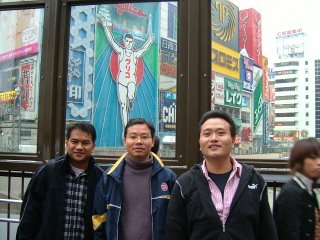A very good reading material indeed. Getting know a man who was once the richest in Penang and even now his legacy keeps piling up.
05 Nov 2006, New Sunday Times
He was a man who landed in Malaysia penniless, but left behind a legacy — besides a huge fortune. LEE KENG FATT talks to family and friends of "Mr Honda" Tan Sri Loh Boon Siew who remember only too well how he touched their lives.
HE came in a small boat on a perilous month-long voyage from China with his mother, younger brother and a cousin in 1929.
He was penniless, illiterate and 13 years old.
But in time, Tan Sri Loh Boon Siew would walk the streets with the rich and powerful.
Starting as an apprentice motor mechanic, he became the richest man in Penang through sheer hardwork and, as some say, great foresight and conviction.
It was his uncanny business instinct that made him what he was — the "King of Motorbikes", "Mr Honda" and later, a philanthropist.
That’s how Boon Siew is known to all and sundry — the man who obtained the Honda dealership from Japan.

Enterprising as he ever was, Boon Siew went on to set up a string of businesses through his investment company, Oriental Holdings.
He had diversified interests in the manufacture and sale of Honda vehicles, manufacture of automotive parts, property development and hotels, locally and in Australia and New Zealand.
There is no doubting that the illustrious Boon Siew, who died in his sleep at the age of 79 in February 1995, is very much a legend.
People still remember him fondly, says Raymond Flower, who co-authored the biography, Tan Sri Loh Boon Siew — The Life and Times of a Fire Dragon, with Winston Lim.
The book, published in both English and Mandarin, will be launched at Boon Siew’s Bayview Hotel George Town by Yang di-Pertua Negeri Tun Abdul Rahman Abbas on Thursday.
The biography, based on interviews with his family, close friends and business associates, presents an overview of Boon Siew’s early struggles and his professional achievements.
It includes his earliest days as a sinkhek (new guest) in Penang, his initial business ventures, the years of the Japanese occupation, the beginning of the Boon Siew group of companies, the story of Honda Motor in Malaysia and Southeast Asia.
The book also touches on the growth of Oriental Holdings, the revitalisation of the newspapers Kwong Wah Yit Poh and the Star, the story of Bayview International and his contributions to charity and the building of Lam Wah Ee Hospital.
Prime Minister Datuk Seri Abdullah Ahmad Badawi, in his message in the book, wrote: "Boon Siew was a real friend to Malaysians from all communities, not just because of his many contributions in cash and kind, but in his deeds as well.
"He never treated people differently because they were rich or poor, came from other ethnic communities or had more or less potential.
"This book comes at an opportune moment to refresh our memories of Boon Siew and the inspirational tale of his triumph over seemingly impossible obstacles.
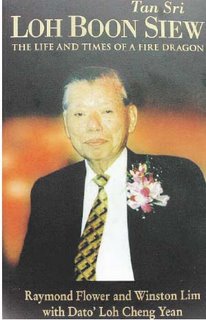
"It also serves as a timely reminder to younger Malaysians that there are no substitutes for hard work, perseverance and the caring attitude that made our nation what it is today."
Boon Siew’s second daughter, Datuk Loh Cheng Yean, said it took her two years to compile the book with Flower and Lim.
"It was my idea to come out with the book as I wanted to keep my father’s memories alive," she said in a telephone interview from Singapore.
Flower is no stranger to Penang, having stayed on the island for 16 years.
"I asked whether it was okay and interesting to have a book on my father and Flower replied ‘absolutely’!
"I realised my father must have encountered numerous people in the course of his life, but I never imagined people would still want to talk about him after all these years.
"In fact, collaborating on this biography has brought back so many memories.
"But the one thing that will always characterise my recollections of my father is that, in his later years, family and good friends were most important to him, not his business, not money or social status.
"He was always reminding us that in life one must be charitable and help those who are less fortunate, and that is why we set up a charity in his name to help fund education for students."
Such was his reputation as a man of the people that even gangsters and kidnappers — who were very active a few decades ago — had a healthy respect for him.
"He did not need a team of heavily armed bodyguards trailing him," says Chinese physician Lee Hack Teik, who used to work at the Lam Wah Ee Hospital, which Boon Siew helped establish.
"The gangsters knew him too well not to harm him."
Except for an attempted extortion by a group of gangsters from out of town, he never felt threatened.
But there was this humorous episode with a bank that thought that it knew Boon Siew too well — it rejected a cheque issued by Boon Siew because the signature was ‘forged’.
"Boon Siew used to sign his cheques in Chinese characters, bearing his full name," Lee remembers.
"His surname Loh has a ‘horse’ character in it, but having no formal education, Boon Siew struggled to sign his name and ended up scribbling the ‘horse’ character without its four legs which became his trademark signature."
He realised later on that the four legs were missing and duly corrected it when he issued his next cheque only for it to be rejected by the bank.
"From then on, he decided to keep his original signature," says Lee, now the Pengkalan Kota state assemblyman.
Boon Siew was a thrifty man, but he never hesitated to help others in need.
"Yes, when I was a recreation manager at Bayview Beach Resort then, I injured my back badly while on duty," said Winston Lim.
"For two weeks, it was touch and go whether I’d walk again and I was advised to have an operation on my spine.
"I couldn’t afford it. The general manager informed Boon Siew who said he would pay for the whole treatment if necessary.
"I was flabbergasted. I’d grown up in Penang hearing stories about his generosity but never imagined that I’d experience it."
Life was no bed of roses for Boon Siew when he arrived in Penang, having to sleep in filthy stage buses every night at the riverside of Prangin Road and squatting by the roadside, eating plain porridge and salted vegetables.
He persevered, and from cleaning buses he eventually owned a fleet of them through the now defunct Penang Yellow Bus Company.
But the most interesting episode must surely be how Boon Siew obtained the Honda dealership.
He was on holiday in Osaka with friends from Penang and Taiwan when he saw a young man riding a Honda motorcycle.
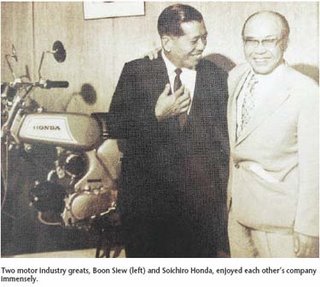
He bought 12 of them — Honda Dreams, Cubs and Benlys — and shipped them back to Penang.
From selling the first 12, Boon Siew went on to sell 20, then 50 and 100 machines and eventually to become the sole distributor for Honda motorcycles in Malaysia.
Boon Siew had six children — four girls and two boys. His marriage to Oh Guat Sim gave him his first daughter, and his marriage with Ong Lay Wah blessed them with the rest.
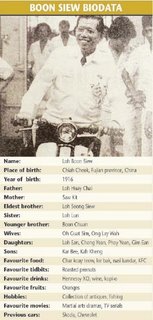
He appointed all his daughters as directors when he formed Boon Siew Sdn Bhd in 1957 as he believed that they should all have a fair share of the family fortune and, later on, his sons-in-law as well.
Neither did he forget his best friends whose children he also brought into his group of companies.
Datuk Syed Mohamad Aidid was one of them.
"Boon Siew acted as my mentor in many ways," says Syed Mohamad.
"I used to call him Ah Pek, a fatherly figure so to speak. Working for him, I learned so much, especially about dealing with life’s unexpected blows and about leadership, integrity and ethics.
"He may have gone for so many years now, but I always feel like he is still around… continuously giving me guidance."
Datuk Oon Choo Khye, the former managing director of Kwong Wah Yit Poh, also remembers Boon Siew fondly.
"I shall always regard Boon Siew as my mentor. He taught me not only about running a business but also how to manage talented people successfully."
One contribution to the people of Penang, which also involved a lot of other citizens, was the establishment of the Lam Wah Ee Hospital.
It is a hospital where no one would be refused treatment for lack of money.
Boon Siew matched ringgit- for-ringgit the RM10 million that the public raised for the establishment of the hospital.
以上です。
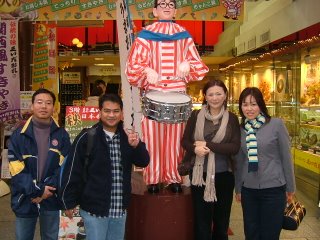
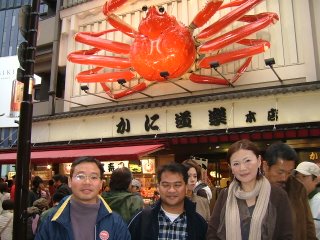 Tanaka-san seems to be very eligible as a tour guide..hehe..She guided us all the way around the street of Nanba town while explaining the related matters in details. Well for the time being she is happy with her carrier now as an OL. She is still available you know..and can speaks italian as well.. buno..buno..
Tanaka-san seems to be very eligible as a tour guide..hehe..She guided us all the way around the street of Nanba town while explaining the related matters in details. Well for the time being she is happy with her carrier now as an OL. She is still available you know..and can speaks italian as well.. buno..buno..